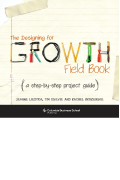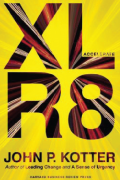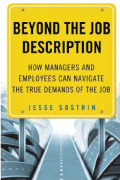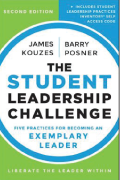TD Magazine Article
An Action Plan for Innovators
A review of The Designing for Growth Field Book: A Step-by-Step Project Guide by Jeanne Liedtka, Tim Ogilvie, and Rachel Brozenske
Thu May 08 2014

The Designing for Growth Field Book: A Step-by-Step Project Guide
By Jeanne Liedtka, Tim Ogilvie, and Rachel Brozenske
Columbia Business School Publishing, 144 pp., $19.95
Although innovation does not guarantee superior business results and long-term sustainability, it certainly gives organizations a fighting chance. Yet many innovative new products and services are never fully realized. Why is that? Simply put, new ideas require a systematic process to successfully bring them to market.
The Designing for Growth Field Book offers a systematic and iterative process for managing such a project, using the kind of "design thinking" typically relied on by creative professionals. As an organizational development professional, I found this type of thinking intriguing.
Early in the book, the authors identify four stages that must be explored prior to embarking on the design-thinking process:
"What is"—identify what works or what is happening now, relative to the product or service that may be introduced.
"What if"—generate ideas in a brainstorming session; free flow of ideas and information is the goal during this stage.
"What wows"—envision the proposed product or service in the marketplace, and try to predict how customers will respond.
"What works"—determine if and how much value the new product or service will generate.
These stages provide an excellent framework for problem solving, allowing readers to explore the effectiveness of possible solutions. They are the precursor to the actual design-thinking process.
When readers are ready to apply their chosen solution, the authors go on to discuss the 15 steps in the process. These steps include identifying an opportunity, drafting a design brief, conducting research, establishing design criteria, brainstorming, developing concepts, creating napkin pitches, making prototypes, soliciting feedback from stakeholders, and running learning launches. The clarity and thoroughness of the authors' approach will help readers customize the process to their own needs.
The book includes easy-to-use tools and templates, which refer readers back to the specific steps where they can be applied. The authors explain how these tools, traditionally used by designers, can be applied to create and launch a new product or service. They include direct observation, journey mapping, storytelling, and storyboarding.
Finally, the book ends with a case study to show how the design-thinking process was used in an actual business scenario.
I recommend this book as a step-by-step guide to design thinking for any organization or individual looking for a smarter way to bring new ideas to fruition.
Accelerate: Building Strategic Agility for a Faster-Moving World

John P. Kotter
Harvard Business Review Press, 206 pp., $25
In the business world, leaders often play whack-a-mole with competitive threats and other problems while big opportunities go by in the blink of an eye. Even if an organization manages to seize an opportunity, change may not happen fast enough or effectively enough, and things often settle back to the status quo. In Accelerate, Kotter, considered the world's foremost expert on leadership and change, explains that the traditional organizational hierarchy is not equipped to respond to an environment where change is the norm. He shows readers how to implement a more agile, network-like structure that operates within an organization's current hierarchy, allowing it to respond more quickly to changes, threats, and opportunities in ways that add lasting value.
Beyond the Job Description: How Managers and Employees Can Navigate the True Demands of the Job

Jesse Sostrin
Palgrave Macmillan, 238 pp., $30
The reality of a job always is different from how it appeared on paper. If we can accept this, we can move on to the problem of how to succeed in what Sostrin calls the "job-within-the-job." The first weeks and months in a new position present many previously hidden challenges, such as internal networking, managing constant change, innovating, and delivering more results with less resources. Sostrin shows readers how to overcome frustration with these unwritten demands by presenting a plan for overcoming performance barriers through continual self-driven learning and constant alignment with business priorities.
The Student Leadership Challenge: Five Practices for Becoming an Exemplary Leader, second edition

James Kouzes and Barry Posner
Wiley, 285 pp., $36
Leadership development is now part of university curriculums all over the world. Businesses know that they can't wait until employees find themselves in leadership positions before they begin teaching the skills needed to guide others. The Student Leadership Challenge is a call to action for young leaders in high school, college, or just embarking on their careers. Authors and world-renowned leadership experts Kouzes and Posner show young readers how to accomplish extraordinary things at school, work, or in their communities. The book is filled with inspiring stories about young leaders around the world, reflective and critical thinking exercises, and evidence-based approaches that every professional, no matter her age, should use.
What's on Erica Ariel Fox's Bookshelf?
Mindfulness for Beginners: Reclaiming the Present Moment—and Your Life by Jon Kabat-Zinn. This wonderful book offers a welcoming introduction to the modes of "doing" and "being." It brings you clarity and direction, reminding you to slow down, take a breath, and enjoy the ride.
The Power of a Positive No: Save the Deal, Save the Relationship—and Still Say No by William Ury. I spend a lot of time advising executives on the negotiations they have with themselves: Should they say yes, no, or stall for time? For many people, finding the right way to say "no" is the toughest challenge. This book offers a useful framework for developing this crucial skill.
Open: An Autobiography by Andre Agassi. As a passionate researcher of the human experience, I love the honesty, humor, and wisdom in Agassi's journey. Despite all of his fame, wealth, and noted achievements, Agassi's struggles and triumphs are surprisingly like the rest of our stories. The book affirms our common humanity.
